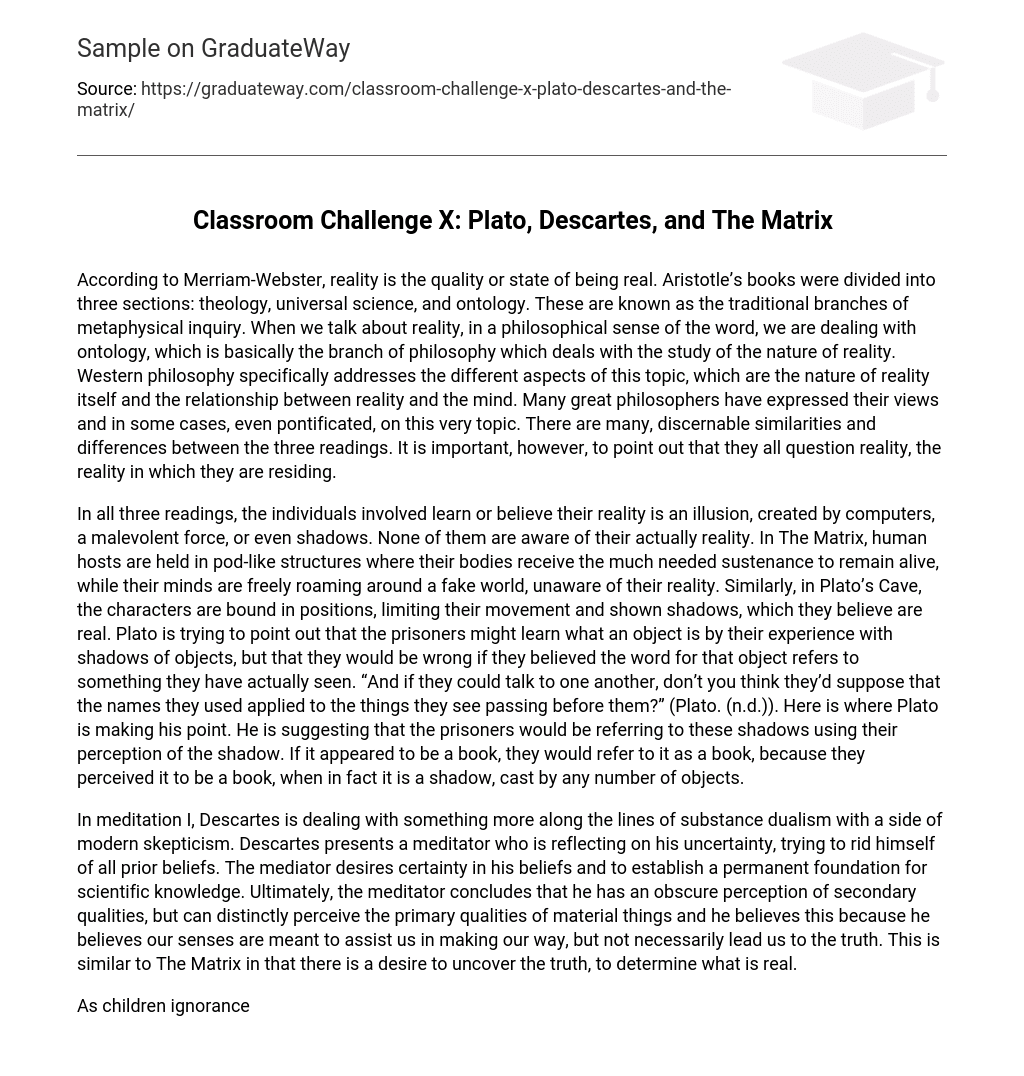According to Merriam-Webster, reality is the quality or state of being real. Aristotle’s books were divided into three sections: theology, universal science, and ontology. These are known as the traditional branches of metaphysical inquiry. When we talk about reality, in a philosophical sense of the word, we are dealing with ontology, which is basically the branch of philosophy which deals with the study of the nature of reality. Western philosophy specifically addresses the different aspects of this topic, which are the nature of reality itself and the relationship between reality and the mind. Many great philosophers have expressed their views and in some cases, even pontificated, on this very topic. There are many, discernable similarities and differences between the three readings. It is important, however, to point out that they all question reality, the reality in which they are residing.
In all three readings, the individuals involved learn or believe their reality is an illusion, created by computers, a malevolent force, or even shadows. None of them are aware of their actually reality. In The Matrix, human hosts are held in pod-like structures where their bodies receive the much needed sustenance to remain alive, while their minds are freely roaming around a fake world, unaware of their reality. Similarly, in Plato’s Cave, the characters are bound in positions, limiting their movement and shown shadows, which they believe are real. Plato is trying to point out that the prisoners might learn what an object is by their experience with shadows of objects, but that they would be wrong if they believed the word for that object refers to something they have actually seen. “And if they could talk to one another, don’t you think they’d suppose that the names they used applied to the things they see passing before them?” (Plato. (n.d.)). Here is where Plato is making his point. He is suggesting that the prisoners would be referring to these shadows using their perception of the shadow. If it appeared to be a book, they would refer to it as a book, because they perceived it to be a book, when in fact it is a shadow, cast by any number of objects.
In meditation I, Descartes is dealing with something more along the lines of substance dualism with a side of modern skepticism. Descartes presents a meditator who is reflecting on his uncertainty, trying to rid himself of all prior beliefs. The mediator desires certainty in his beliefs and to establish a permanent foundation for scientific knowledge. Ultimately, the meditator concludes that he has an obscure perception of secondary qualities, but can distinctly perceive the primary qualities of material things and he believes this because he believes our senses are meant to assist us in making our way, but not necessarily lead us to the truth. This is similar to The Matrix in that there is a desire to uncover the truth, to determine what is real.
As children ignorance can serve to protect or shield us from the many things in life we may not be able to comprehend. For most of us, our parents protect us from knowledge that they believe might be too much for our young minds to bear or process. We operate on a sort of need-to-know basis. Ignorance in that sense of the word, is only practical when you have an adult to guide you. As we mature and become independent, we have to learn to think for ourselves. Maturing in many ways, sullies many of the ideals we had about the world. As that veil of idealization erodes, reality becomes more apparent and in many ways, we experience many new things, both good and bad. Regardless of how bad they can be, the harshness of reality, in my opinion, is better than any ignorance is bliss type illusion. Our capacity to comprehend and process knowledge is what separates us from the rest of the animal kingdom. We are born to think, to question, learn, and innovate. Electing to remain ignorant, like Cypher, goes against our very nature as humans. The more we live and experience life, the more we learn, and as we learn and grow, we change as a result. Although we may not be completely in control of every aspect of our lives, we are mostly free and make the choices for ourselves. Whether we become doctors or drug addicts, those paths are elected by us. Neo’s decision to live in reality and fight to inform everyone else of the truth is the right choice, in my opinion.
References
- Descartes, R. (1641). Meditation I of The Things of Which We May Doubt. Meditations on First Philosophy.
- Merriam-Webster Dictionary.
- Plato. (n.d.). The Allegory of the Cave. In The Republic (P. Book VII).
- Wachowski, A. &. (Director). (1999). The Matrix. [Motion Picture]





